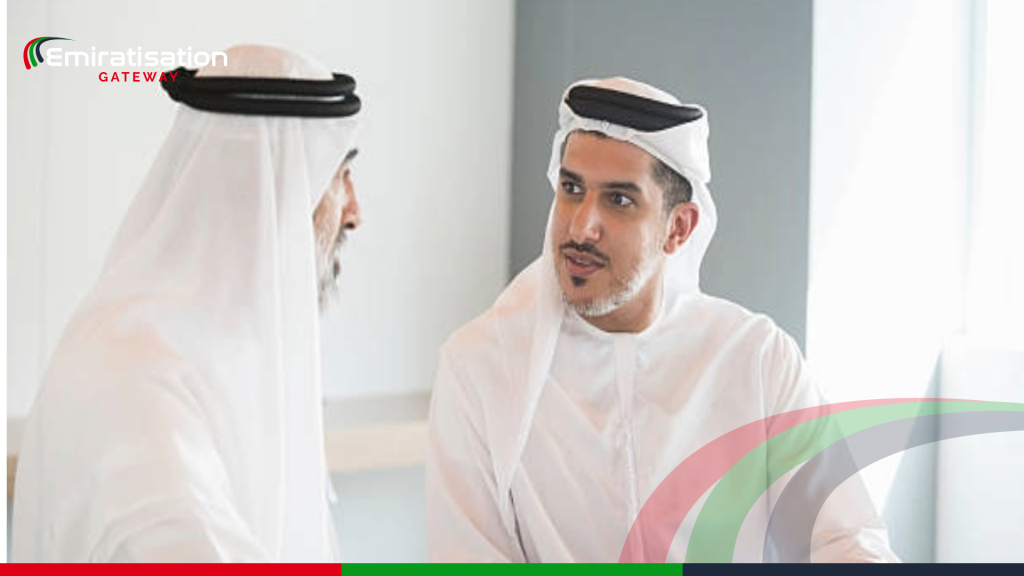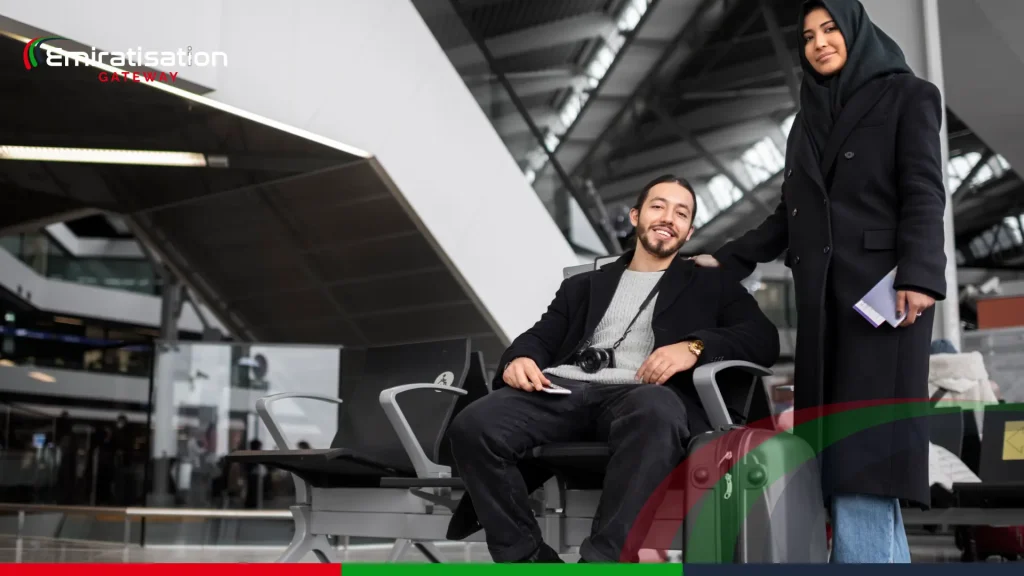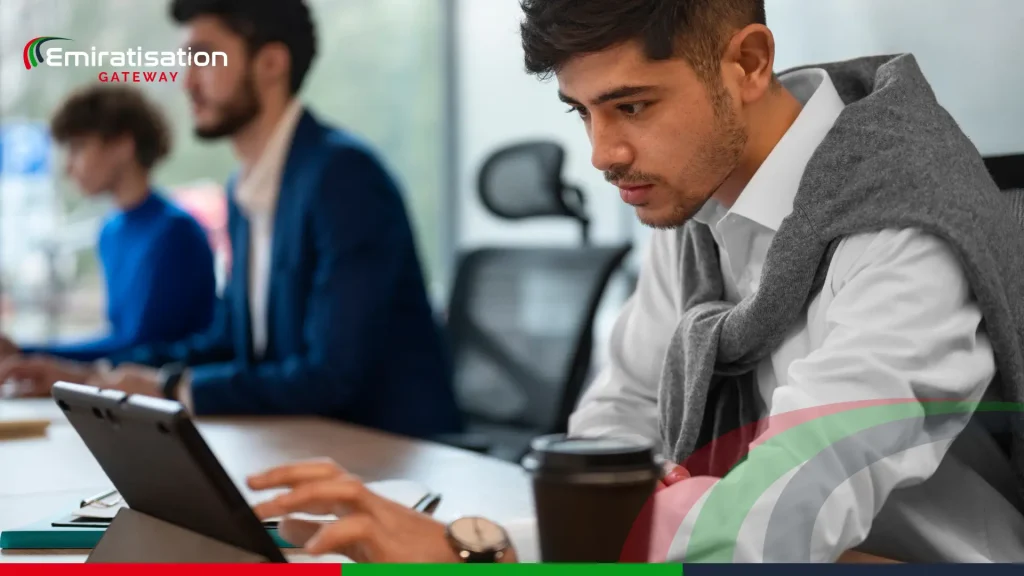Emiratisation is the UAE program of prioritizing the employment of Emirati nationals in various sectors. It has been a significant focus in the United Arab Emirates. Free zones are economic hubs with distinct regulations and incentives. They have also been integral to the country’s development.
In this blog, we explore the interplay between Emiratisation and free zone business environments. This helps in examining the potential impacts and challenges involved. Therefore, let’s jump to the next section and discuss the important details regarding Emiratisation in free zone.
Welcome to Emiratisation Gateway’s Insight on Emiratisation in Free Zones
Some of the initiatives undertaken by the government of UAE include Emiratisation. It meant increasing the rate of participation of Emirati nationals in the workforce. Free zones have special economic zones with distinct regulations and incentives. They contribute a lot towards the development of the country economically.
Emiratisation Gateway helps you in understanding the implications of Emiratisation in the free-zone business environments. Additionally, in this article we pen down the challenges, opportunities, and strategies for successful implementation.
Overview of Emiratisation in Free Zones
Across the UAE, Emiratisation in free zones is the policy of prioritizing Emirati national’s employment within free zone companies. The initiative is the broader effort of the UAE. The purpose is to empower its citizens and diversify its economy. The Emiratisation aims to Promote the employment of Emiratis in various roles within free zone companies. The UAE government can develop local talent. This in turn fosters the development of a skilled Emirati workforce.
With Emiratisation, knowledge transfer becomes easy. It facilitates the transfer of knowledge and expertise from expatriates to Emiratis. Additionally, Emiratisation boosts economic diversification. This contributes to the diversification of the UAE’s economy. It can be done by reducing reliance on foreign labor.
Lastly, Emiratisation in free zones presents both opportunities and challenges for businesses. It can help foster a more inclusive and sustainable business environment. Also, it may require adjustments to recruitment and talent management strategies.
What is Emiratisation?
Implemented by the UAE government, Emiratisation is a policy initiative to increase the participation of Emirati nationals in the workforce. The purpose behind this is to promote the development of local talent. This in turn reduces reliance on foreign labor. While contributing to the nation’s economic diversification.
Emiratisation in Free Zones: Key Differences
Emiratisation is a general policy implemented across the UAE. However, there may be some variations in its application within different free zones.
The are specific Emiratisation targets for some free zones. The targets are set for companies operating within their boundaries. They can vary in terms of the percentage of Emirati employees required.
On the other hand, the free zones may offer support programs to encourage Emiratisation. This includes financial subsidies or training initiatives. However, the specific regulations and guidelines related to Emiratisation may differ slightly between different free zones.
Economic Impact of Emiratisation in Free Zones
In free zones, Emiratisation has a significant economic impact. The program contributes to the overall development and diversification of the UAE economy.
The program can be utilized in transferring knowledge and Skill Development. It fosters the transfer of knowledge from expatriates to Emirati employees. Hence, it enhances the local workforce’s capabilities. Due to the introduction of Emiratisation, Emirati nationals gain valuable experience and develop specialized skills. This in turn contributes to their career growth. It also aids in the overall competitiveness of the UAE’s workforce.
The Emirati nationals have more new opportunities. As it can create new job opportunities for Emiratis. Especially in sectors that have traditionally relied on foreign labor. The Emiratisation program reduces reliance on foreign labor by increasing Emirati participation. The free zones can also reduce their reliance on foreign labor. This leads to greater economic stability.
Emiratisation also promotes innovation and entrepreneurship. They empower Emirati entrepreneurs to start their businesses. By doing so, they contribute to the innovation ecosystem. Emiratisation has developed a knowledge-based economy. By developing an entrepreneurial Emirati workforce, free zones can foster a knowledge-based economy.
Boosting the Local Economy
Emiratisation increases domestic consumption. As more Emiratis join the workforce. This increased income leads to higher domestic consumption. While it boosts the local economy. The program also promotes market diversification. Emirati consumers have different preferences and spending habits. It can contribute to market diversification and economic growth.
Attracting Investment
Emiratisation therefore enhances international standing through foreign investments. A proper Emiratisation policy helps the country emerge as business-friendly, thereby attracting investment and talent into the country. In addition, Emiratisation shows the UAE’s commitment to social responsibility for sustainable development.
Social Impact of Emiratisation in Free Zones
Emiratisation strengthens community ties by increasing social cohesion. This brings more Emiratis into the workforce and promotes social integration. The Emirati employees can feel a greater sense of belonging and ownership in their communities. The more Emiratis inclusion reduces social inequality. Emiratis are open to more opportunities from all backgrounds.
Emiratisation also promotes diversity and inclusion which can lead to increased innovation and creativity. Emiratisation promotes an inclusive culture by prioritizing Emirati employment. The free zones can create a more inclusive and welcoming environment for all employees. Emiratisation can facilitate cultural exchange and understanding between Emiratis and expatriates.
Strengthening Community Ties
Emiratisation increases social cohesion. It can foster stronger community ties by bringing more Emiratis into the workforce. Helping to promote social integration. Emiratisation creates a sense of belonging. The Emirati employees can feel a greater sense of belonging and ownership in their communities. The program reduced social inequality by providing opportunities for Emiratis from all backgrounds.
Promoting Diversity and Inclusion
Emiratisation can contribute to a more diverse workforce. It can lead to increased innovation and creativity. Emiratisation introduces inclusive culture. By prioritizing Emirati employment, free zones can create a more welcoming environment for all employees.
The Cultural exchange is another impact that comes with Emiratisation. As it can facilitate cultural exchange and understanding between Emiratis and expatriates.
Challenges Faced by Free Zone Companies
Free zones, which are designated areas within a country that have different economic regulations than the rest of the country, offer various incentives to businesses, such as tax breaks and customs advantages. However, companies operating within these zones can still face several challenges:
Regulatory Changes
Regulatory changes include government policies and compliance requirements. Free zones are subject to changes in government policies and regulations. Shifts in trade laws, tax regulations, or local economic policies can affect operations. However, keeping up with changing regulations can be complex and require continuous adaptation.
Market Access and Competition
The free zones have limited market reach. Some free zones are designed for specific industries or activities. It can limit market access or the scope of business operations. As a result, they may face heightened competition from other businesses in the same zone. Especially if the zone is known for a particular industry.
Administrative and Bureaucratic Challenges
Paperwork and administrative procedures can be cumbersome. This is particularly true for businesses that operate across multiple zones or countries. Coordination with Authorities is another challenge. Companies might need to interact with various governmental and regulatory bodies. It can be time-consuming and complex.
Infrastructure Issues
Infrastructure involves the facilities and services and maintenance and upgrades. The quality of infrastructure and services in some free zones may not meet the needs of all businesses. Therefore, ongoing maintenance or upgrades may be necessary but can be costly or disruptive.
Economic and Political Stability
Economic instability or fluctuations can impact business operations. Particularly in free zones dependent on international trade. That’s why, changes in political leadership or international relations can influence free zone business environments.
Cultural and Social Challenges
Finding and retaining skilled local talent can be challenging. Especially if the local workforce lacks the necessary skills. The cultural differences in business practices and consumer behavior can be difficult for international companies.
Reputation and Perception
Some free zones may face scrutiny regarding the practices of the businesses operating within them. Companies need to manage their brand image carefully to avoid any association with negative aspects of the free zone.
Legal and Tax Implications
Understanding the legal and tax implications specific to the free zone can be complex. Particularly if laws vary from those outside the zone. Disputes over tax obligations or incentives can arise. This requires legal assistance and potentially impacts operations.
Supply Chain and Logistics
Free zones often offer customs advantages. However, businesses still need to manage logistics and potential delays at borders. Disruptions in global supply chains can impact businesses operating in free zones. Impacting those reliant on international imports or exports.
Technology and Innovation
Some of the other challenges include keeping up with the increased technological advancement and integration for businesses within the free zones. This, in addition, increases the chances of companies being compromised by cybersecurity events with increased use of more digital systems.
Meeting Emiratisation Quotas
Under Emiratisation, meeting Emiratisation Quotas is essential for employers. The strict targets are set by Free zone authorities. They are termed as Emiratisation quotas that companies must meet.
In case of qualified Emirati Talent shortage in certain sectors. This makes it challenging to fill designated positions. Additionally, the skill gap is another challenge. Emirati employees may require additional training to meet the specific requirements of certain roles.
Balancing Expat and Emirati Workforce
Cultural differences are one of the major challenges. Managing a diverse workforce with varying cultural backgrounds is not easy. However, effective integration of Emirati employees into the existing company culture is also a hurdle
Additionally, knowledge transfer from expats to Emiratis is one of the issues. Facilitating the transfer of knowledge from expatriates to Emirati employees can fix this problem.
Benefits of Emiratisation for Free Zone Companies
The benefits of Emiratisation have been discussed in detail:
Enhanced Corporate Reputation:
Emiratisation demonstrates a company’s commitment to the UAE’s social and economic development. This in turn enhances its public image and attracts top talent.
Access to Government Incentives:
Emiratisation compliance companies may enjoy financial incentives, regulatory benefits, and greater government support.
Improved Market Access:
Emiratisation can help companies better understand the local market and build stronger relationships with Emirati consumers.
Talent Development:
Investing in Emirati talent can contribute to the development of a skilled and qualified workforce. It benefits the company’s long-term growth.
Social Responsibility:
Emiratisation aligns with the UAE’s vision of a sustainable and inclusive society. This demonstrates corporate social responsibility.
Enhanced Corporate Reputation
Emiratisation promotes a positive public image. It demonstrates a company’s commitment to the UAE’s social and economic development. A strong Emiratisation record can attract top talent. This includes both Emirati and expatriates. It contributes to the development of the local community and enhances a company’s reputation and social standing.
Access to Government Incentives
Many free zones offer financial incentives to companies that meet their Emiratisation targets. Compliant companies may enjoy preferential treatment or reduced regulatory burdens. They receive greater support and assistance from government agencies.
Strategies for Effective Emiratisation in Free Zones
Strategies must be carried out for effective Emiratisation implications in free zones. Conduct a thorough assessment of your current workforce. While identifying the number of Emirati employees and their roles. Establish specific Emiratisation targets aligned with government guidelines and your company’s goals. Assess the skills and qualifications required for your Emirati employees and identify any gaps. For instance, you have to focus on:
- Developing a comprehensive Emiratisation plan
- Leveraging Emiratisation Gateway’s services
Developing a Comprehensive Emiratisation Plan
Developing a comprehensive Emiratisation plan is necessary. For this, create tailored training programs to address skill gaps and enhance the capabilities of Emirati employees. Establish performance management systems to monitor and evaluate the progress of Emirati employees.
Leveraging Emiratisation Gateway’s Services
Worried about Emiratisation implications in your organization? Utilize the Emiratisation Gateway’s resources and tools to support your Emiratisation efforts. You can consult with experts for advice and guidance on best practices. With us, you can stay informed about the latest Emiratisation policies, regulations, and initiatives.
The Strategic Importance of Emiratisation for Free Zone Businesses
Emiratisation is the policy of prioritizing the employment of Emirati nationals in the UAE. It holds significant strategic importance for free zone businesses. Businesses can enjoy several benefits by embracing Emiratisation. It enhances corporate reputation. While demonstrating a commitment to the UAE’s social and economic development. This fosters a positive public image.
The Emiratisation compliance companies can benefit from various financial incentives and regulatory advantages offered by the government to support Emiratisation. Companies can gain a better understanding of the local market. It helps them build stronger relationships with Emirati consumers. Emiratisation also contributes to the development of a skilled and qualified Emirati workforce, fostering innovation and entrepreneurship.
In short, Emiratisation is not only a legal requirement but also a strategic opportunity. Particularly for free zone businesses to thrive in the UAE.
Partner with Emiratisation Gateway for Seamless Compliance
Emiratisation Gateway is your trusted partner for navigating the complexities of Emiratisation in the UAE. Our expert will help you understand meeting Emiratisation quotas. The comprehensive platform offers a range of services to help free zone businesses achieve their Emiratisation goals. Get along with us to solve your Emiratisation targets!
Contact Emiratisation Gateway Today
Benefit from our team of experts who specialize in Emiratisation policies and regulations. Here, you will get the personalized solutions. We tailor our services to meet your specific needs and objectives. Get the comprehensive support. From initial assessment to ongoing compliance, we provide end-to-end support.
Gain access to resources by utilizing our platform. Here, you will get access to valuable resources, tools, and information related to Emiratisation. At Emiritisation Gateway, stay informed about the latest Emiratisation developments and best practices.
Contact Emiratisation Gateway today to learn more about how we can help you achieve your Emiratisation goals and ensure compliance with UAE regulations.
Conclusion
In conclusion, Emiratisation in free zones plays a crucial role in shaping the business environment in the UAE. Free zone companies can contribute to the nation’s economic development. This can be done by prioritizing the employment of Emirati nationals. It also fosters social inclusion and enhances their corporate reputation.
This is essential for employers to familiarize themselves with the UAE’s Emiratisation policies and their significance. For this, they should create a tailored Emiratisation plan that aligns with your business goals and complies with government regulations. To streamline your efforts, utilize the support and resources provided by the Emiratisation Gateway.
However, you should be prepared to address the challenges associated with Emiratisation. Those include meeting quotas and balancing your workforce. It is essential to recognize the long-term benefits of Emiratisation such as enhanced corporate reputation, access to government incentives, and improved market access.
Free zone companies can contribute to the UAE’s economic growth by embracing Emiratisation and implementing effective strategies. It fosters a more inclusive business environment and builds lasting relationships with the local community.






